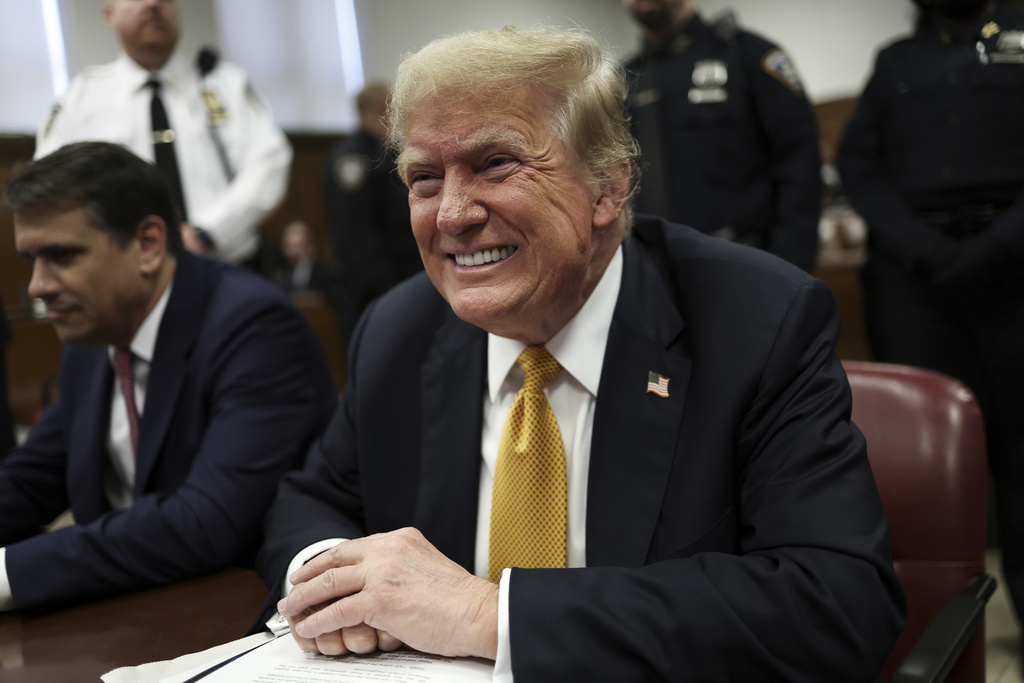NEW YORK — Former President Donald Trump sat and watched as the judge presiding over his historic trial gave instructions to the jury that could bode poorly for his prospects of acquittal in the Manhattan hush money case.
The jury is now deliberating whether to convict or acquit Trump over the 34 counts of falsification of business records he faces in the trial. Judge Juan Merchan told the jury that the burden of proof is on the prosecution and not Trump, noting that just because the former president did not testify in the case does not mean his silence can be used as a factor for determining guilt or innocence “beyond a reasonable doubt.”

However, Merchan affirmed that the jury need not agree on what the other crime is that Trump allegedly sought to conceal when he allegedly falsified documents, a widely expected decision that could ultimately work heavily against him.
“Merchan just delivered the coup de grace instruction,” George Washington University law professor Jonathan Turley said while listening to instructions from within the courtroom.
Merchan said the jurors “can disagree on what the crime was among the three choices” presented by prosecutors, Turley noted, which include violations of tax laws, falsification of other business records, or violations of the Federal Election Campaign Act.
“Thus, this means that they could split 4-4-4 and he will still treat them as unanimous,” Turley added.
As the former president exited the courtroom for lunch, he acknowledged the damning instruction Merchan just handed to the jury, saying even “Mother Teresa could not beat these charges.”
“These charges are rigged,” Trump said. “The whole thing is rigged. The whole country’s a mess between the borders and fake elections and you have a trial like this.”
Trump would become the first former president to be convicted of felony crimes if the jury finds him guilty, as he runs for a second term in the Oval Office this November.
Although Merchan said the jury must be unanimous in deciding whether Trump is guilty on each count of falsification of business records, legal experts in the room suggested there does not appear to be much flexibility for a mixed verdict or a finding that Trump was guilty or innocent of some but not all charges.
“Thirty-four guilty verdicts or 34 not guilty verdicts or a hung jury,” former federal prosecutor Trey Gowdy said. “I cannot foresee a verdict with some counts as guilty and others as not.”
Merchan told the jurors that reasonable doubt does not mean having no doubts at all, explaining that “there are very few things in this world that are known without some uncertainty.” But he gave a caveat that for the jury, “it is not sufficient to conclude the defendant is probably guilty.”
The judge also referenced the witnesses brought by the prosecution in the case, namely former Trump attorney Michael Cohen, who made the $130,000 hush money payment to porn star Stormy Daniels that prosecutors say was concealed through the alleged business record falsifications at issue.
Merchan said Cohen is legally viewed as an “accomplice” in Trump’s case and that the jury may not convict Trump solely on Cohen’s testimony.
“Our law is especially concerned about the testimony of an accomplice … particularly when the accomplice has received, expects, or hopes for a benefit in exchange for their testimony,” Merchan said.
In other words, even if jurors find Cohen’s testimony believable, despite his history of perjury in the courtroom, they “may not convict the defendant solely based on that testimony unless you find it is corroborated by other evidence.”
Prosecutors spent more than four weeks of testimony attempting to prove Trump paid Cohen monthly installments of $35,000 to repay him for making a $130,000 payment to Daniels to keep her from going public with allegations of an affair with Trump ahead of the 2016 election.
The 34 counts reflect 11 invoices, 12 vouchers, and 11 checks that comprise the payments to Cohen.
During Daniels’s testimony, she described in detail her alleged sexual encounter with Trump in 2006 and how Cohen paid her $130,000.
Cohen tied Trump to key business records underpinning the charges that make up the indictment, though defense attorneys Todd Blanche, Susan Necheles, and Emil Bove sought at every opportunity to discredit Cohen and portray him as a serial liar.
The defense only brought forth two witnesses, including Robert Costello, an ex-adviser to Cohen who pushed back on Cohen’s claims that Trump was personally involved in the hush money deals.
Merchan finished instructing the jurors before noon Wednesday and explained that there is a laptop available to jurors to view all the evidence during deliberations.
CLICK HERE TO READ MORE FROM THE WASHINGTON EXAMINER
The jury could take hours or even days to come to a determination. Jurors do not have access to a copy of the instructions that were presented to them, but they may ask the judge for refreshers at any time.
Trump and lawyers are expected to remain in the courthouse Wednesday afternoon while the jury deliberates in the event the panel sends a note to the judge that must be addressed.
